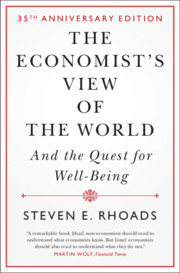Book contents
- More Praise for The Economist’s View of the World
- The Economist’s View of the World
- The Economist’s View of the World
- Copyright page
- Dedication
- Contents
- Preface
- Acknowledgments to the First Edition
- Acknowledgments
- Introduction
- Part I Useful Concepts
- Part II Government and Markets, Efficiency and Equity
- Part III The Limits of Economics
- 7 The Economist’s Consumer and Individual Well-Being
- 8 Representatives, Deliberation, and Political Leadership
- 9 Conclusion
- Notes
- Index
7 - The Economist’s Consumer and Individual Well-Being
from Part III - The Limits of Economics
Published online by Cambridge University Press: 24 September 2021
- More Praise for The Economist’s View of the World
- The Economist’s View of the World
- The Economist’s View of the World
- Copyright page
- Dedication
- Contents
- Preface
- Acknowledgments to the First Edition
- Acknowledgments
- Introduction
- Part I Useful Concepts
- Part II Government and Markets, Efficiency and Equity
- Part III The Limits of Economics
- 7 The Economist’s Consumer and Individual Well-Being
- 8 Representatives, Deliberation, and Political Leadership
- 9 Conclusion
- Notes
- Index
Summary
Economists find they can make useful predictions if they assume that selfishness dominates market behavior. They assume people want more goods, services, and leisure. Selfishness will often get one more goods, services, and leisure. Not surprisingly, then, studies show that economists are somewhat more selfish than the rest of us. Economists place unbalanced emphasis on narrow self-interest as both controlling motive and route to happiness.
Major economists of the past, such as Smith, Marshall, Pigou, and Knight, thought it was part of their task to remind readers that there are high and low pleasures, that many of the high ones require reason and the sometimes painful acquisition of knowledge, that we aspire to better tastes, and that such aspirations are sometimes hindered by businesses that cater to vices and overemphasize the importance of what money can buy. Today’s economists are more likely to feel a professional obligation to combat such sentiments.
Actual human beings look up to people who are virtuous. They get pleasure from selfless behavior such as volunteering. We are fortunate to have two growing schools of thought, virtue ethics and positive psychology, that combat economic relativism.
- Type
- Chapter
- Information
- The Economist's View of the WorldAnd the Quest for Well-Being, pp. 177 - 220Publisher: Cambridge University PressPrint publication year: 2021

